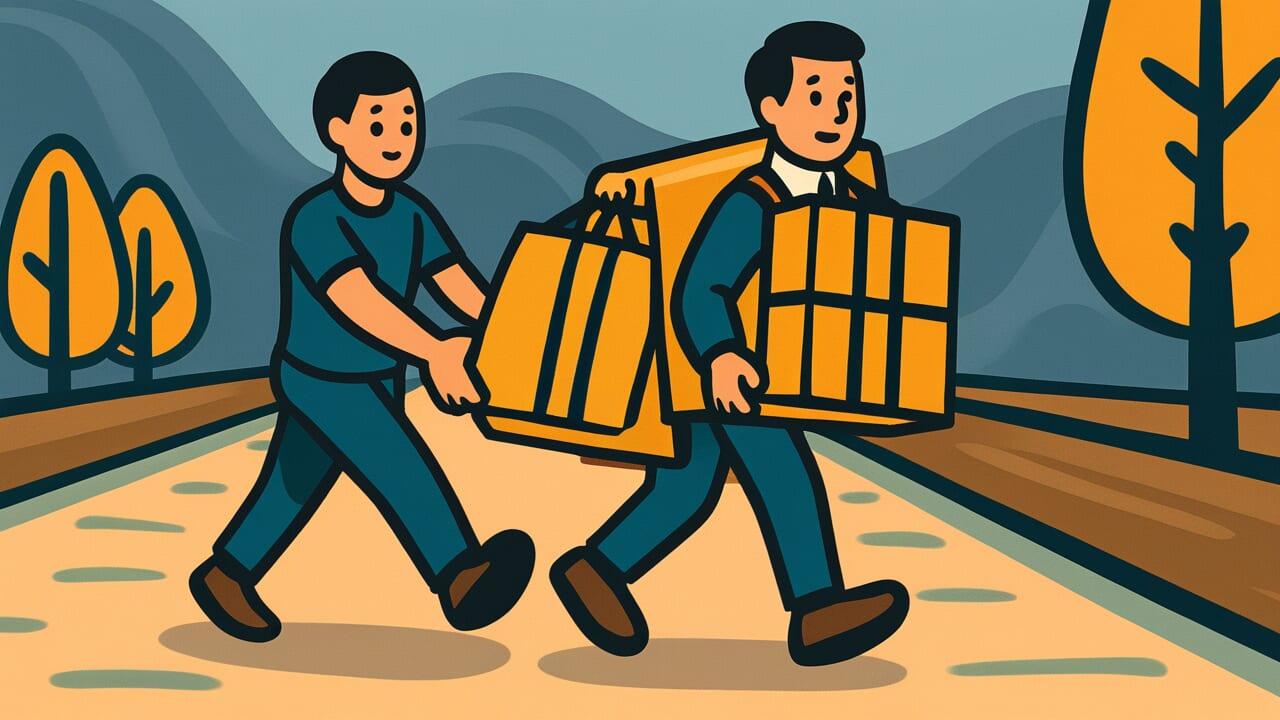How to Read “The greatest burdens are not the gainfullest”
The greatest burdens are not the gainfullest
[BURD-ens] [GAYN-ful-est]
The word “gainfullest” is an old form meaning “most profitable” or “most rewarding.”
Meaning of “The greatest burdens are not the gainfullest”
Simply put, this proverb means the heaviest responsibilities don’t always bring the biggest rewards.
The literal words paint a clear picture. A burden is something heavy to carry. Gainful means profitable or rewarding. The proverb tells us that the hardest jobs or biggest responsibilities might not pay the most. They might not bring fame or recognition either.
This wisdom applies everywhere in modern life. Parents work incredibly hard raising children but rarely get thanked. Teachers shape young minds for modest pay. Caregivers tend to sick relatives without any payment. Meanwhile, some people make fortunes doing easier work. The stock trader might earn more than the nurse saving lives.
What’s fascinating is how this challenges our assumptions about fairness. We often think hard work automatically leads to big rewards. This proverb reminds us that life doesn’t work that way. The most important work often goes unnoticed. The heaviest responsibilities usually come with the smallest paychecks.
Origin and Etymology
The exact origin of this specific proverb is unknown. However, similar sayings about work and reward appear throughout English literature. The unusual word “gainfullest” suggests it comes from an earlier period of English. This type of wisdom was common in agricultural societies.
During medieval and early modern times, people understood work differently than today. Most labor was physical and demanding. Farmers, craftsmen, and laborers carried literal burdens daily. They also knew that the hardest jobs rarely made people wealthy. The heaviest work often paid the least.
These observations about unfair rewards spread through oral tradition first. Later, they appeared in written collections of sayings. The proverb reflects centuries of working people’s experiences. It captured a truth that every generation had to learn again. Eventually, it became part of common wisdom about work and life.
Interesting Facts
The word “burden” comes from Old English “byrthen,” meaning “a load to be carried.” It’s related to the word “birth,” since both involve carrying weight.
“Gainful” developed from the Old Norse word “gagn,” meaning “advantage” or “benefit.” The “-fullest” ending creates a superlative form that sounds old-fashioned today.
This proverb uses contrast as a teaching device. By comparing “greatest” with “gainfullest,” it highlights the gap between effort and reward.
Usage Examples
- Manager to employee: “I know the overtime pays well, but working 80-hour weeks will destroy your health and family life – the greatest burdens are not the gainfullest.”
- Parent to college student: “That prestigious law program costs twice as much and has brutal competition – the greatest burdens are not the gainfullest.”
Universal Wisdom
This proverb reveals a fundamental tension in human society between value and reward. Throughout history, the most essential work has often been the least compensated. This pattern exists because truly important burdens serve others rather than the person carrying them.
The psychological roots run deep in human nature. We naturally expect fairness – that hard work should equal good rewards. When reality contradicts this expectation, we feel confused or angry. Yet the proverb suggests this imbalance isn’t a mistake. It’s how human communities actually function. The most crucial responsibilities exist precisely because they serve the group’s survival, not individual gain.
This wisdom also exposes how societies distribute both burdens and benefits. Those who carry the heaviest loads often do so out of love, duty, or necessity rather than choice. Parents don’t raise children for profit. Soldiers don’t risk their lives for money alone. Community leaders often sacrifice personal time and resources. Meanwhile, those who accumulate the most rewards frequently do so by avoiding heavy burdens rather than carrying them. This creates a paradox where the most valuable contributions receive the least recognition, while the most rewarded activities may contribute less to human wellbeing.
When AI Hears This
Humans treat effort like a price tag on rewards. We assume harder work automatically means bigger payoffs. This creates a mental trap where people chase the most exhausting tasks. They believe suffering equals future success, so they grab the heaviest burdens available.
This happens because our brains use shortcuts to judge value. When something requires more energy, we think it must be worth more. It’s like assuming expensive items are always better quality. People avoid easy opportunities because they seem too good to be true. We trust struggle more than we trust simplicity.
What’s fascinating is how this backwards thinking actually protects us sometimes. By choosing hard paths, humans build strength and skills they didn’t expect. The heaviest burdens teach lessons that easy wins never could. Sometimes the real reward isn’t money or success, but becoming someone capable of carrying impossible weights.
Lessons for Today
Understanding this wisdom begins with recognizing the difference between importance and reward. The most meaningful work in life often comes with personal costs rather than benefits. Accepting this reality helps us make better decisions about what burdens to carry and why.
In relationships, this insight proves especially valuable. The people who support us most deeply rarely expect payment or recognition. They carry emotional burdens because they care, not because it benefits them. Recognizing their sacrifices helps us appreciate what we might otherwise take for granted. It also guides us toward reciprocating their care when opportunities arise.
For communities and organizations, this wisdom suggests rethinking how we value different contributions. The janitor keeping a hospital clean carries a burden as important as the surgeon performing operations. The teacher staying late to help struggling students serves the community as much as the wealthy donor funding new buildings. While we cannot always change reward systems, we can change how we recognize and respect different types of service. The greatest burdens may not be the most gainful, but they are often the most necessary for human flourishing.



Comments